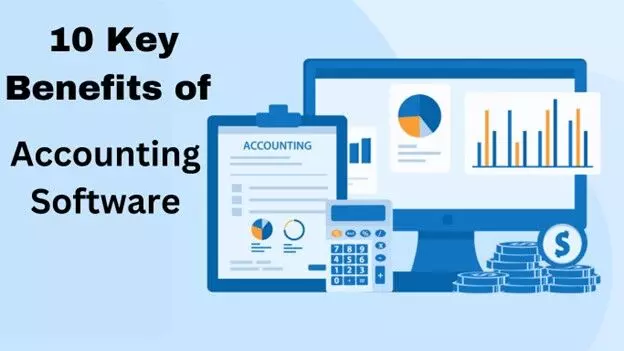10 Key Benefits of Accounting Software

Accounting can quickly become a headache for small businesses as they grow. More sales mean more invoices, more transactions to record, and more financial reports to prepare. To keep up without drowning in paperwork, many businesses use accounting software. This type of software automates many accounting tasks, resulting in quicker processes and heightened precision. It frees up time for business owners and accountants to focus on growing the business instead of getting bogged down in paperwork.
Today, software is essential for running businesses efficiently. Accounting software is a prime example. It offers numerous benefits, like saving time and reducing errors. In this piece, we'll delve into how accounting software makes managing finances easier for small businesses.
What is accounting software?
Accounting software is a digital solution to help individuals and businesses effectively manage their financial records and transactions. It simplifies tracking income, expenses, and other financial activities in a centralized system. By automating tasks like transaction recording, invoice generation, and tax calculation, this software reduces manual workload and decreases the likelihood of errors. Additionally, it offers features like integration with payment processors, enabling seamless financial operations.
From small startups to large corporations, accounting software caters to businesses of all sizes and can be customized to suit specific needs and preferences. Its easy-to-navigate interface and intuitive features make it an indispensable asset for efficient financial management for businesses.
10 key benefits of accounting software
Following are top ten benefits of employing accounting software for small business operations;
1. Seamless Data Accessibility: Accounting software offers the convenience of accessing financial data anytime and from any location. Unlike traditional systems, which may require access from a specific device or location, accounting software allows users to retrieve information effortlessly using any internet-enabled device, such as laptops or smartphones.
2. Collaborative Efficiency: Collaborating on documents and projects used to involve cumbersome processes like saving files to USB drives or emailing attachments back and forth. However, with modern collaboration tools, such as cloud-based platforms, teams can work together seamlessly in real-time. Users can work together on documents at the same time, so there's no confusion about versions or waiting for updates. This makes teamwork smoother and gets projects done faster and better.
3. Streamline Repetitive Tasks: Much of the daily workload for accountants and bookkeepers revolves around manual and repetitive tasks. For instance, generating invoices for each sale, tracking transactions, and sending payment reminders to customers are routine activities that consume valuable time. However, modern accounting software offers automation capabilities that excel in handling such repetitive processes. By automating various steps in the accounting workflow, accounting software for small business significantly reduces manual intervention and allows professionals to focus on more strategic tasks for improved productivity.
4. Advanced Protection Measures: A significant advantage of utilizing cloud-based accounting software is the heightened level of security it provides for your financial data. With all accounting information stored in the cloud, multiple layers of advanced encryption techniques ensure the confidentiality and integrity of your data. This surpasses the security offered by traditional storage methods, such as physical filing cabinets or local servers. Additionally, the synchronization feature ensures that your data is consistently updated across all devices, guaranteeing not only its safety but also its freshness at all times.
5. Elevate Accuracy Levels: By utilizing online accounting software, you can mitigate the occurrence of common accounting errors. These software solutions streamline and organize your accounting processes for precision and efficiency in every task. Furthermore, they effectively reduce the likelihood of inaccuracies associated with stale or outdated data, thereby enhancing the overall accuracy of your financial records and bookkeeping activities.
6. Stay Updated: Integrating online accounting software with your business bank account gives you access to real-time tracking capabilities for essential financial aspects such as expenses, sales, and inventory. With a dedicated dashboard provided by the accounting software, you can conveniently monitor all relevant accounts and metrics at a glance. This simple method helps you stay informed with the newest financial info.
7. Optimize Expenditure: You might be curious about how investing in paid software could contribute to cost savings for your business. The explanation is straightforward. Implementing online accounting software can yield significant time savings, approximately 300 hours annually. This calculation considers the reduction in time spent on various tasks such as repetitive activities, rectifying accounting discrepancies, and generating financial reports. By making these processes simpler, businesses can cut down on costs and use resources better.
8. Simplify Recordkeeping and Enhance Support: Managing documents can be tedious and costly. Avoid the hassle of manual snapshots by effortlessly generating them with a single click. The benefit of utilizing the best accounting software lies in the accessibility of all financial records, spanning journal entries, financial statements, and reports, conveniently available online.
9. Optimized Billing Process: Generating invoices is a fundamental accounting task for businesses of all sizes and industries. Regardless of the nature of the sale, the process of creating and issuing invoices remains consistent. Traditionally, this involved manual methods such as Excel or Word documents. However, accounting software automates the invoicing process which helps businesses save time and be more accurate.
10. Simplified Tax Compliance: Accounting software offers a user-friendly solution for managing tax obligations, alleviating the complexity often associated with tax-related tasks. Rather than grappling with intricate tax laws and regulations, businesses can rely on accounting software to handle tax calculations, filings, and reporting efficiently. With features tailored for tax management, such as automated updates and reminders, businesses can stay compliant with tax requirements while focusing on core operations and growth initiatives.
Conclusion
Accounting software simplifies financial tasks for businesses and alleviates the burdens associated with accounting tasks. With features like real-time data access and collaborative tools, it streamlines operations and enhances efficiency. By handling tax compliance and reducing paperwork, it frees up time for strategic business growth. Overall, accounting software for small businesses is a valuable asset that facilitates smoother financial management and promotes success.














